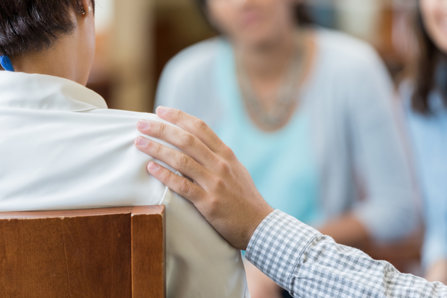How Addiction Hurts the Whole Family & How to Help

There is no way around it; addiction doesn’t just hurt the individual suffering from the condition; it breaks down the entire family and everyone connected to the situation. So often, people will justify their drug or alcohol use by saying they are not hurting anyone but themselves. While that idea may seem like a reasonable thought to the person saying it, it’s not true. Even if the person with the addiction is no longer on speaking terms with their family, chances are their family members are still feeling the effects of the addiction.
Sometimes people will be in denial about their addiction, and the only way they will be willing to go to treatment is if their family holds an intervention. Interventions aren’t an easy process, but they are often the very thing that saves a person’s life. If you or someone you love is struggling with an addiction, chances are you have been experiencing some of the following issues.
1. Strained relationships.
One of the easiest ways to strain any relationship is for one of the people in the relationship to have an addiction. Addiction will often cause people to hurt the ones they love the most. This isn’t usually something that is done intentionally. Sadly, it tends to happen when this type of problem is in the mix. Many relationships have been destroyed because of addiction, which is a shame because relationships make life so wonderful. While it may take a lot of work to rebuild things with family members after going to treatment, it will be well worth the effort of doing so if that means regaining the connection with one’s family.
2. Broken trust.
Another sad thing about addiction is that it causes people to lie about various things. The lies usually start simple enough, like how much a person is drinking, where they were, what happened to the money they borrowed, etc. The list of lies caused by addiction can go on and on. The sad thing is that the more a person lies to someone else, the more their trust will be broken. Trust is not easy to gain but is very easy to lose. Regaining the confidence of a loved one will take a lot of time and effort after a person gets sober, and understandably so.
3. Financial problems.

Addiction causes people to spend most of their resources on drugs and alcohol. The further a person gets into their habit, the more money they will pay to maintain that addiction. People desperate for cash will often start to borrow money from their family and friends. The trouble with borrowing money while caught up in addiction is that it will be complicated to pay that money back. If you loan money to someone who has an addiction, then chances are you won’t see that money again. The more things like this happen, the more a relationship will suffer.
4. Fear and anxiety.
There is nothing worse than fearing for the life and safety of a loved one. Parents who have children using illicit drugs often worry that they will never see their children again. The chances of overdose are very high, especially the longer a person uses drugs. People with family members that have drinking problems often worry about their loved one getting arrested for driving under the influence. The list of fears that come with having a loved one with an addiction can go on and on. This fear can very quickly begin to take a toll on a person’s overall well-being.
5. Social Stigma.
One of the saddest things about addiction is the social stigma surrounding the condition. Unfortunately, so many people out there are judgemental when it comes to this issue. The social stigma surrounding addiction makes things difficult not only for the person dealing with the addiction but also for their family. So many family members who have loved ones with an addiction will face judgment from others who do not understand this condition. The social stigma surrounding addiction does nothing to solve the problem and only makes things worse for everyone involved.
Now that we have addressed a few ways that addiction hurts a family, let’s look at ways a person dealing with addiction can improve these issues.

1. Going to rehab.
One of the best things that a person with an addiction can do to get better is go to treatment. Addiction rehab will not only help the individual but also help the family to begin the healing process as well. However, it is essential to note that simply going to rehab is not enough to fix all of the problems and mend all of the addiction’s damage; it is also necessary that the person puts in the work needed to make things better.
2. Addressing the root causes of the addiction.
When looking for treatment options, it is a good idea to look for a program that will help address the root causes of the addiction. Simply stopping drinking or using drugs is not enough to stay sober. A person that wants to live a life of recovery will need to go through a process that will help them understand the underlying cause of their addiction and develop new life skills to help prevent them from returning to unhealthy coping mechanisms in the future.
3. Developing new life skills.
A person struggling with an addiction will need to learn new life skills to help them deal with the everyday stresses of life without returning to using drugs or alcohol. There are often several contributing factors at play that make the condition worse when it comes to addiction. When a person can develop new life skills, they are better equipped to live a sober life and thrive while doing so.

4. Rebuilding trust and relationships.
Rebuilding trust and relationships takes a lot of time and effort on both parts. A person will not complete this whole process while they are in treatment, but they will at least be able to get a good start on things. The work of mending relationships must continue well past the treatment stage in order to be effective.
5. Taking responsibility.
The number one thing that a person with an addiction will need to do to turn their life around is to take responsibility for the condition that they are in and then take the necessary steps to get better. While we cannot control everything that happens to us, we certainly can control how we respond to things. Once a person takes responsibility for their condition, they can put in the work to make things better.
Overcoming addiction is not always an easy thing to do. Still, thankfully there are plenty of resources available for those willing to take the next step in addressing their problem. If you or someone you love has an addiction, one of the best things you can do is reach out for some form of professional help. There is no shame in asking for help; the only shame is the regret of never trying to get better.
Sources:


 ®
®